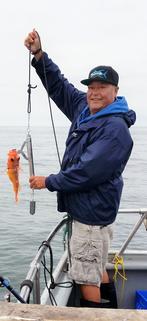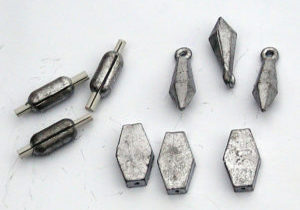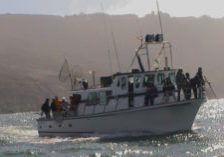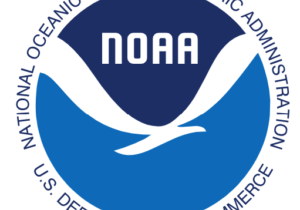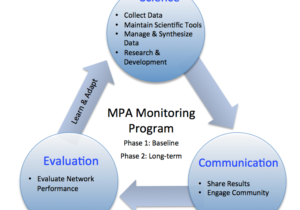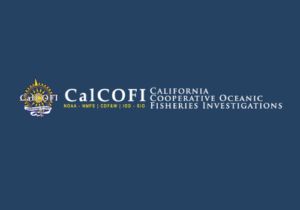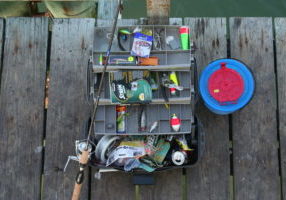Committed to the Stewardship of Our SoCal Fishery
Enhancing Sustainable Fishing Through Cooperative Education
OSA Conservation Policy & Guidelines
The Oceanside Senior Anglers have always promoted conservation in all of its activities and with all of its members. The club has adopted a conservation policy as a cornerstone of its efforts to learn, educate and communicate the importance of conservation with all of its members.
Our conservation policy is as follows:
The Oceanside Senior Anglers are committed to the conservation of fishing resources in order to maintain and improve the quality of our sport fishing activities. Club members and guest are expected to:
- Comply with all relevant fishing regulations for club charters and side trips.
- Carefully handle and release fish that are alive, either prohibited by fishing regulations, unwanted, or are not needed for consumption.
- Avoid any actions that might have a detrimental effect on the aquatic environment.
- Promote good conservation practices to fellow members and others through education and example.
The intent of our policy is to state a principle and position for the club. The club does not intend to try and enforce this policy, this is not our business. As in most areas, ultimately it is up to the individual to do what is right.
Members can assist by speaking up when you see a member or guest causing a conservation concern. The person may not know there is a problem. If they do know they may not know how to resolve the problem. Set good examples and show other members how to improve conservation compliance by practicing good conservation ourselves. Do it yourself and don’t rely on the deckhand to safely release your fish. If he has time and is willing to help that is great, but each member is expected to be capable of safely releasing his or her own fish. Practice recycling of old fishing line on and off the ocean. Respect the ocean by not throwing trash or other non-biodegradable materials into the ocean.
Please feel free to ask questions and if you know the conservation requirement but don’t know how to achieve it then please ask for help. As a club, we can help contribute to conservation efforts, protect our environment and enhance our fisheries.
Thomas “Bo" Bolender—Conservation Chairman
OSA Supports Calico Bass Tagging Project
On our OSA Wounded Warrior trip of yesterday, July 2, 2014
We caught and released four previously tagged Calico Bass. I logged the Tag data which is included below.
Location: 32° 50.5' N - 117° 18.3' W
Time: 1100 - 1130 hours
12" Calico, Tag #6371
10" Calico, Tag #5625
13" Calico, Tag #9618
13" Calico, Tag #919
Our Wounded Warriors did it again this year. Yes, they caught a tagged Calico off of La Jolla while on our last WW trip of the year. A call has been placed to NOAA about the tag. As of Sept 9, I have not heard from the NOAA Lab. Will keep you posted on the details of when the fish was tagged and by who (What tagging trip)
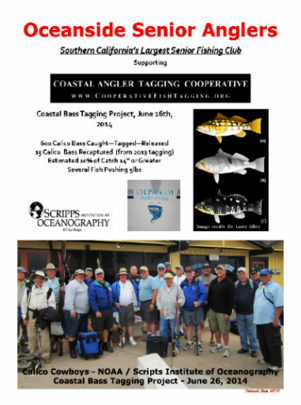
OSA members who contributed: Bo Bolender, Greg Thompson, Hal Reeser, Bill Woodcook, John DeWitt, Wes FArmer, Len Pincus, George Maynard, Peter Fruendlich, Asa Mori, Dave Nordquist, Hank Mabrey, Ed Dennis, Kris Thorsten, Lee Wood, Don Rogers, John Delaurentis, Kelly Kissenger & Manny Ontiveros
How Old is That Calico Bass?
Chart Courtesy, Milton Loves "Certainly More Than You Want to Know About The Fishes of the Pacific Coast.
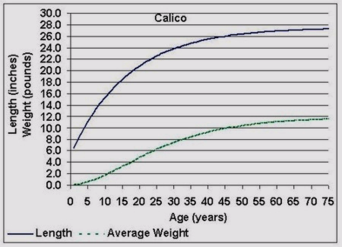
As an angler, are you aware Kelp Bass (Paralabrax clathratus), also referred to as Calico Bass, Grow So Slow? We have all been told that our heroes of the kelp are slow growers, but this chart hits home with a visual Length, Weight vs Age.
Remember, Practice CPR. Catch - Photograph - Release. Our club presents handsome pins to those who release breeder bass. You can help.
OSA Line Recycling Program
Running Results of OSA Mono Recycle Program
Total = 168.0 miles
2014 - April-5.71, May-9.88, July-4.8, Aug-3.34, Nov 21-5.6
2015 - Feb -7.42, April-6.23, June 3.65, Aug 15.44, Sept 21.06
2016 - April 17.65, Nov 12.33
2017 - April 15.82 - Dec 13.68
2018 - April 12.84 - Oct 13.0
2019 - Jan - Dec 48.0
Shipments in Miles
With the help of Berkley, we turn used mono into fresh water fish condos.

Releasing Tuna While Still in the Water
Pelagic Prototype Release Tool Tested
The clubs first pelagic release tool was successfully tested on a recent 2.5 day trip. 14 YFT and 1 Skippy were released without being pulled from the water. This is the first time the tool has been tested on commercial sport boat with free boards greater than 4 ft.
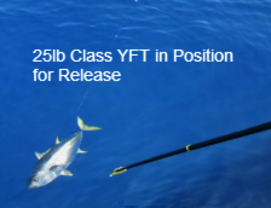
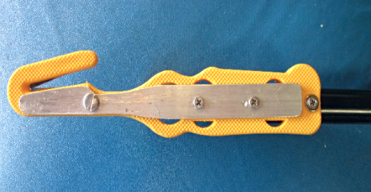
Offshore Yellowtail Tagging Project with NOAA-UCSD
OSA Yellowtail Tagging Project Supports UCSD Phd Studies
After the successful calico bass tagging trip, we contacted NOAA-Scripps with the idea of expanding to another fishery. I was introduced to a Scripps Phd student, Noah Ben-Aderet who was conducting a Yellowtail science project, which included tagging inshore yellowtail to study their migration habits.
Noah was introduced to the OSA board and gave his overview of tagging experience on the New Lo Ann, based out of Point Loma Sport Fishing. The board approved his process and he was invited to join a October OSA club charter and we would try our best to tag some offshore YT.
The club contacted Promar nets and explained what we were up to to and how we thought a net would aid in bringing the fish on board to be measured and tagged. Promar graciously donated a large rubbed coated net for our use.
We have just completed the charter and we were able to tag several very large YT (47" in length) and few smaller models. The net worked perfectly and the stress to the fish was reduced substantially.
We plan on developing a C_P_R program for the 2015 Tuna season and use the net to Catch (C) - Photograph (P) - Release(R) Tuna.
What a great research project. Science and Fishing...Fantastic Stuff.
"Cow Cod" Cowboys Tagging Trip June 2016
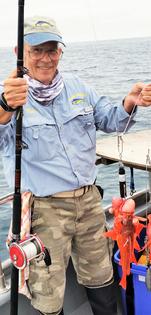
The Calico Cowboys ventured forth, dawned new Hats for this tagging trip and became the “Cow Cod Cowboys”. OSA Vice Prez, Kris Thorsten headed this detail which was comprised of the following OSA members: John DeWitt, Peter Rohrich, Edd Robinson, Kelly Kissinger, Maurizo Mangini, Wes Farmer, Hank Mabrey, Greg Thompson, John Tester, and Randall Mattes. We boarded the OUTER LIMITS, owned and captained by Paul Fischer. Our lead NOAA/Scripps representative was Lyall Bellquist.
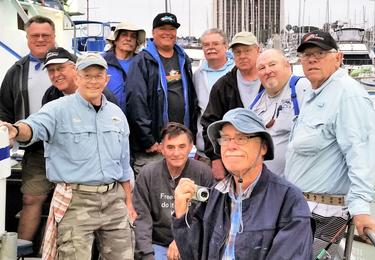
The scientific approach for this tagging operation was to locate, catch, tag, and release cow cod and rock cod species of fish. Within this platform, the criteria of importance was to catalog, monitor, tag, and record…… the location and dept the fish were found/caught, species and quantity caught of each, look for previous tags, type of descender used, approximate time required to catalog information and then release. We used five (5) different descender mechanisms (1) Sheldon, (2) Black Tip, (3) Roklees, (4) Sea Qualizer, and (5) Milk crate. After the operation was over, we were given Forms for each of us to evaluate and provide our opinions of the descenders used.

![]()
